Youth geared for top strength
Ridma DISSANAYAKE
|
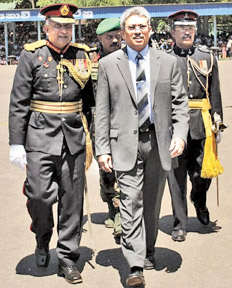
Defence Secretary Gotabaya Rajapaksa with NCC Director Major
General Gamini Jayasundara and Colonel Y K Abeyratne
|
Sri Lankans have suffered a lot from terrorism. The security forces
eliminated terrorism launching a humanitarian operation under the
progressive leadership of President Mahinda Rajapaksa and enormous
guidance of Defence Secretary Gotabaya Rajapaksa. Defence Secretary
Gotabaya Rajapaksa has taken all measures to build a strong next
generation with proper skills, knowledge and good values.
He recognized the National Cadet Corps (NCC) as the greatest team to
initiate this special programme which creates a powerful next
generation. Accordingly Defence Secretary plans to widen Sri Lanka’s NCC
network. It has widened in Northern and Eastern provinces.
History
|

MP Namal Rajapaksa visiting a leadership training programme in
Rantambe |
John B Cull, a former Principal of Royal College formed a Volunteer
Corps with the intention of promoting discipline by doing drill in the
year 1881 and his effort became fruitful when expansion occurred with
the introduction of a Cadet Battalion in 1902 recruited from schools and
attached to the Ceylon Light Infantry (CLI ). At the time the Acting
Commandant of the Volunteer Force was Major HG Morns, of the Duke of
Cornwall Light Infantry.
SM Burrows was the Director of Public Instruction, as the post of
Director of Education was known then. Companies were formed at Royal,
St. Thomas, Wesley, Kingswood, Trinity and Richmond Colleges. These were
commanded by honorary officers from among teachers and senior students.
Cadet Battalion of CLI was reorganized with effect from September 1,
1910.
* School Cadets between 12 and 16 formed companies commanded by
teachers.
* Cadets on reaching 16 years were eligible for transfer to Cadet
Companies called Cadet Companies CLI. They were commanded by officers
seconded from CLI.
Further expansion took place in1918. Brigadier General RB Fell,
Commandant CVF recommended the disbanding of the Cadet Companies and the
formation of the Cadet Battalion with two divisions, seniors and
juniors. Diyatalawa was set up in1904 after Boer War. Cadets attended
camp together with Ceylon Planters’ Rife Corps (CPRC), CLI, British, and
Indian Regiments. In 1948 the Commanding Officer of the Ceylon Cadet
Battalion (CCB) was appointed the Ceylonese Commandant of the Ceylon
Defence Force. CCB became the Ceylon Cadet Corps (CCC) in 1950.

Activities and training at a cadet camp |
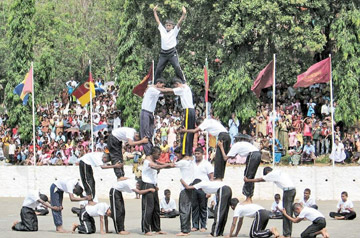
A drill display by the cadets |
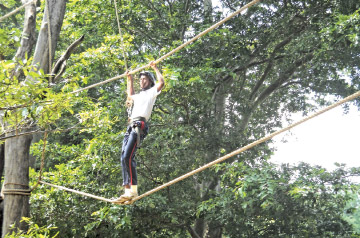 |
 |
|
Advanced course 5 and 7 |
In the same year second Battalion was formed with Headquarters in
Kandy and 1st Battalion Headquarters shifted to Kalutara. Thus with its
progress in 1953 the third Battalion was formed.
Status quo
Since that it had become a long tour of 131 years passing number of
milestone in the golden history of Sri Lanka NCC while guiding youth to
be leaders in the country with the aim of making them well disciplined,
motivated youth from school going generation for the service of the
nation. Training and inspiring cadets using and effective training
curriculum so that each cadet shall develop character, courage,
sportsmanship, self-reliance, discipline, civic mindedness, spirit of
adventure, responsibility and comradeship to be a human resource of well
trained youth capable of providing leadership in all aspects of life is
the mission of the NCC.
“Currently the NCC is training over 60,000 cadets which include Army
Wing, Naval Wing, Air Force Wing, Police Wing and Western and Eastern
Band Cadets formed by both boys and girls. The numbers of cadets are to
be increased up to 100,000 by the year 2016 and the NCC is to train
around 10,000 cadets per year from 2013 to 2016 to achieve the above
target,” said Sri Lanka NCC Director Major General Gamini Jayasundara.
“The NCC, the premier youth development organization which operates
under the purview of Defence Ministry and the guidance of Defence
Secretary Gotabaya Rajapaksa, has successfully being contributing with a
proud history of 131 years from its inception in 1881 to mould the
resource of well trained and motivated youth with leadership qualities
to serve the nation,” he explained.
“While grooming and determining the younger generation, in the past
we have been supporting officers and other ranks of the Armed Forces and
the Police by organizing intensive English, Tamil and Sinhala language,
computer and counseling courses catering to their need. In addition to
that we have already engaged in training university grants in leadership
qualities and positive thinking. We have trained around 3,000 university
grants at the first leadership training,” he added.
The NCC is playing a vital role in preparing youth to be responsible.
As well as it is a very good extra-curricular activity and it will also
help to build a good personality. At present a large number of cadets
are gathering at the NCC Training Centre at Rantambe annually for their
Assessment Camps. The NCC plans courses well ahead to meet the
administrative, training and logistic requirements of trainees.
Camps
They have held around 50 camps in this year and the number of
participants in these camps has also increased. The number of cadets at
camps has increased from 8452 in 2005 to 41,985 in 2012. The number of
girls attached to the NCC has increased up to 19,850 in this year. Under
the instructions of the Defence Ministry under which the NCC function,
seven new battalions and seven provincial headquarters have been set up
since 2005. Band Cadets adds a new dimension to the youth. Band Cadets
have to follow the entire syllabus.
The Assessment Camps of the Naval, Air and Police wings are new
additions to the Corps. Naval and Air Force wings completed their
assessments at their training academies. At present there are 7000 Naval
Cadets and 4350 Air cadets trained under the NCC.
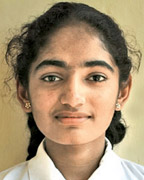 |
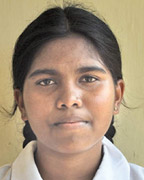 |
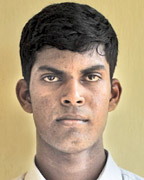 |
|
Sashini Hansika |
V
S Palihawadana |
A Ajanthan |
They need to go through drill, physical efficiency test, map reading,
field craft, point 22 firing, leadership training, first aid, learning
the law of the country, lessons on dangerous drugs, human rights,
current affairs in addition to learning regimental duties and NCC
knowledge.
Courses
Intensive English language courses of 45 days are conducted twice a
year - one for the cadets who finish GCE Ordinary Level and another for
those who complete GCE Advanced Level.
As a part of NCC’s mission to develop resourceful, responsible,
resilient, loyal leaders and team players, the National Cadet Corps
offer a wide range of adventure and experimental programmes such as the
Cadets Advance Course.
The Advance Course is designed for Senior Cadets to develop
leadership. Another specific wing of the NCC would be the Cadet Junior
Leadership Course, which is a seven-day leadership and positive attitude
programme.
This is designed to suit the adventurous nature of a youth. The
programme caters to the demand of the Corporals and Lance Corporals of
the platoon.
With a view to increase international understanding and heighten
awareness the NCC held Youth Exchange Programmes with the NCCs of two
SAARC countries in 2005.
Views of participants
With the guidance of Defence Secretary the exchange programmes were
initiated in Bangladesh, India the Maldives, Nepal, Bhutan and Pakistan.
Some cadets who have selected to take part in these programmes expressed
their ideas to the “Daily News”. Navy Girl Cadet Sergeant Sashini
Hansika Godage from Bandarawela Central College said that “I am very
proud to be a cadet girl and I think being a cadet will be very useful
to lead a well-planned life. This helps me to develop my skills and the
personality as well.”
A Battalion under Officer V S Palihawadana from Matara Sujatha
Vidyalaya said that Cadet training is very helpful to develop the
containment in the students and it also trains the students to lead a
well behaved life. “I think that a cadet is always different from the
others. Because they are always active than others and very forward,”
she said.
A Company Senior Under Officer A Ajanthan from Hartely College,
Jaffna said that they have received a great opportunity to become cadets
with the end of terrorism. He paid his gratitude to the President,
Defence Secretary and to all officers attached to the NCC for making the
country free from terrorism.
In addition the NCC initiated new programmes to upgrade the level of
the Sri Lankan Cadets since 2005 with the fullest support and guidance
of the Ministry of Defense. ‘Kumara Pawura’ - the School Security
programme was launched in collaboration with the Presidential
Secretariat and the Education Ministry.
“The NCC is going on under the theme of “Never Be Unprepared” to make
a strong next generation to Mother Lanka and I would like to extend the
gratitude to President Mahinda Rajapaksa, Defence Secretary Gotabaya
Rajapaksa and everybody who provided their contribution to make the NCC
the leading youth development organization in the country on behalf of
the NCC,” said Major General Jayasundara concluding his conversation. |







